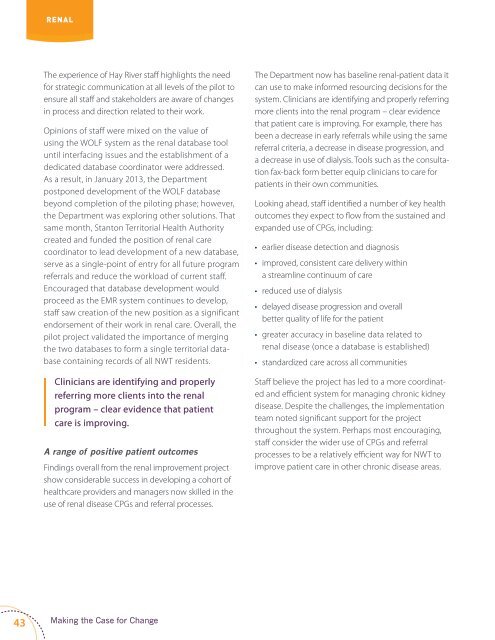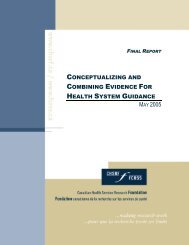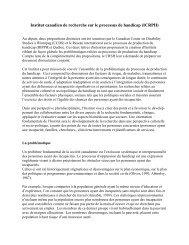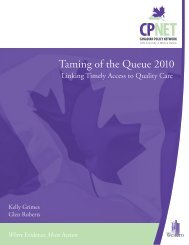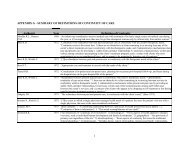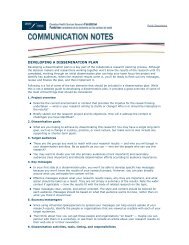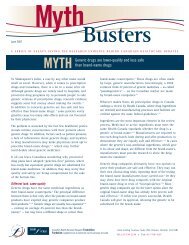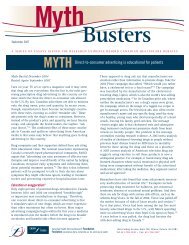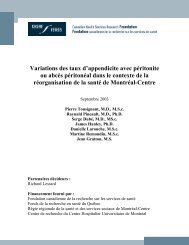Full Report
Full Report
Full Report
You also want an ePaper? Increase the reach of your titles
YUMPU automatically turns print PDFs into web optimized ePapers that Google loves.
RENAL<br />
The experience of Hay River staff highlights the need<br />
for strategic communication at all levels of the pilot to<br />
ensure all staff and stakeholders are aware of changes<br />
in process and direction related to their work.<br />
Opinions of staff were mixed on the value of<br />
using the WOLF system as the renal database tool<br />
until interfacing issues and the establishment of a<br />
dedicated database coordinator were addressed.<br />
As a result, in January 2013, the Department<br />
postponed development of the WOLF database<br />
beyond completion of the piloting phase; however,<br />
the Department was exploring other solutions. That<br />
same month, Stanton Territorial Health Authority<br />
created and funded the position of renal care<br />
coordinator to lead development of a new database,<br />
serve as a single-point of entry for all future program<br />
referrals and reduce the workload of current staff.<br />
Encouraged that database development would<br />
proceed as the EMR system continues to develop,<br />
staff saw creation of the new position as a significant<br />
endorsement of their work in renal care. Overall, the<br />
pilot project validated the importance of merging<br />
the two databases to form a single territorial database<br />
containing records of all NWT residents.<br />
Clinicians are identifying and properly<br />
referring more clients into the renal<br />
program – clear evidence that patient<br />
care is improving.<br />
A range of positive patient outcomes<br />
Findings overall from the renal improvement project<br />
show considerable success in developing a cohort of<br />
healthcare providers and managers now skilled in the<br />
use of renal disease CPGs and referral processes.<br />
The Department now has baseline renal-patient data it<br />
can use to make informed resourcing decisions for the<br />
system. Clinicians are identifying and properly referring<br />
more clients into the renal program – clear evidence<br />
that patient care is improving. For example, there has<br />
been a decrease in early referrals while using the same<br />
referral criteria, a decrease in disease progression, and<br />
a decrease in use of dialysis. Tools such as the consultation<br />
fax-back form better equip clinicians to care for<br />
patients in their own communities.<br />
Looking ahead, staff identified a number of key health<br />
outcomes they expect to flow from the sustained and<br />
expanded use of CPGs, including:<br />
• earlier disease detection and diagnosis<br />
• improved, consistent care delivery within<br />
a streamline continuum of care<br />
• reduced use of dialysis<br />
• delayed disease progression and overall<br />
better quality of life for the patient<br />
• greater accuracy in baseline data related to<br />
renal disease (once a database is established)<br />
• standardized care across all communities<br />
Staff believe the project has led to a more coordinated<br />
and efficient system for managing chronic kidney<br />
disease. Despite the challenges, the implementation<br />
team noted significant support for the project<br />
throughout the system. Perhaps most encouraging,<br />
staff consider the wider use of CPGs and referral<br />
processes to be a relatively efficient way for NWT to<br />
improve patient care in other chronic disease areas.<br />
43<br />
Making the Case for Change


